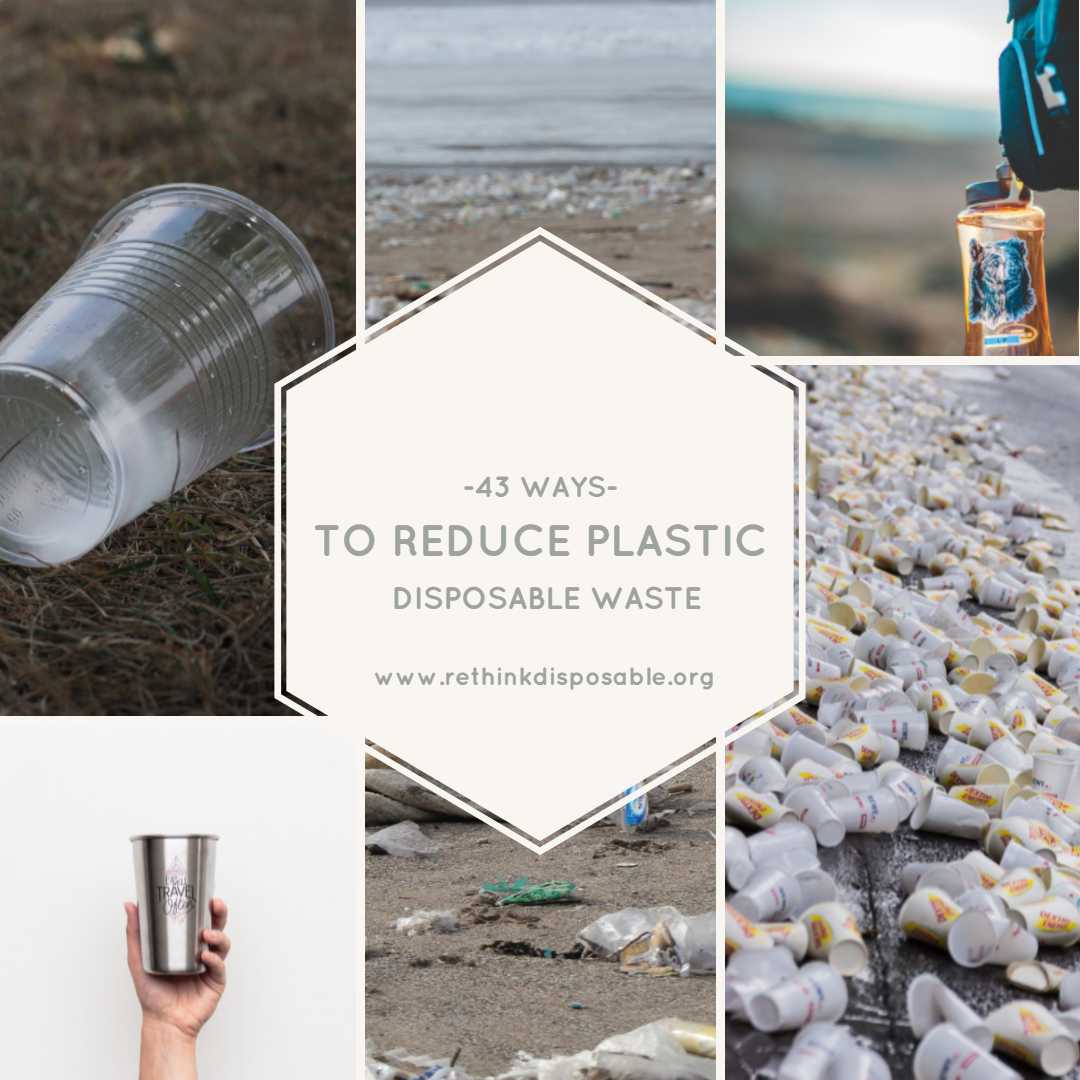
The number of plastic disposables produced has risen from 2 million tons to 380 million tons between 1950 and 2015, half of which has been produced within the last 13 years (The Ocean Conservancy). However, making small changes in our daily lifestyles can reduce our use of plastics. Over time, our consumer choices reduce the demand for this notorious material and ultimately stem its production. How do you reduce your plastic waste? Here is a list of ideas presented by ReThink Disposable to either get you started or expand upon your current low-plastic lifestyle. Some of these are obvious, while others are a bit more obscure. See how many you can check off the list!
Home and Family
- Eliminate straws and refuse straws at restaurants. If you need one, buy a metal, glass, or bamboo straw instead.
- When getting food from restaurants, eat on-site instead of ordering take-out (it’s fun to go out sometimes, no?).
- Buy bar soap instead of liquid soap.
- Avoid buying single serving sizes of yogurt, hummus, etc. if you know it will not go to waste (works especially well for mid to large-size families).
- Consider swapping plastic wrap and zip-lock bags in the kitchen for glass containers, or even use wrap made from beeswax instead of plastic.
- Make your own yogurt, hummus, guacamole, bread, or any other foods that come in plastic packaging (nutritious and delicious!).
- Buy condiments stored in glass containers instead of plastic containers.
- Use fabric tablecloths for parties instead of plastic ones.
- Avoid buying plastic toys; buy eco-friendly ones or experiential gifts instead.
- If you have a yard or access to a P-Patch, consider starting your own garden to grow your own fruits and veggies.
- Use plastic items to their fullest extent before replacing them. This includes everything from phone cases, flip flops, headphones, sunglasses, etc.
- Try eliminating garbage can liners around the house, especially in cans typically used for waste without much liquid. Throw trash in the cans directly.
- Eliminate disposable plastic dishware and utensils from your party routine. When having guests, try to use reusable dishware.
- Avoid giving out plastic party favors at birthday parties, weddings, and other events (Yes, this might mean ditch the bubbles for something more creative! Birdseed, butterflies, and bells are just a few of many potential alternatives.)
- Avoid crafts that use glitter and other plastic-intensive materials.
- Buy music, movies, etc. digitally instead of CDs and DVDs in plastic cases.
School, Office, and On-the-Go
- Bring reusable bags to the grocery store, mall, drugstore, and anywhere else you shop.
- Bring reusable mesh cotton bags to the grocery store for produce.
- Bring a reusable cup when you are on-the-go for your favorite coffee, water, or drink!
- Avoid using plastic stirrers for your coffee.
- Bring your own lunch to work in glass, metal, or hard plastic reusable containers.
- Bring reusable utensils and bottles with you when you know you’ll be on-the-go.
- Order ice cream in a cone instead of using a cup and spoon.
- When ordering take-out, tell restaurants not to include condiment packages if you know you won’t use them.
- Takes notes on a laptop if you have one instead of using notebooks and binders with plastic covers. Otherwise, use notebooks with cardboard covers instead of plastic notebooks and binders.
- Eliminate coffee pods from home and work.
- Use refillable pens.
- When getting food on-the-go, order something that requires little dishware and utensils like a sandwich rather than a soup or salad.
- Make sure garbage bags are full before throwing them away. When at hotels, consolidate your trash to one trash can instead of two—otherwise both bags will be thrown out each day regardless of how full they are.
- Bring your own reusable containers when you know you will be taking leftovers from restaurants and parties.
- Opt for wooden pencils instead of plastic lead-filled ones.
Personal Hygiene
- Buy floss in glass containers; avoid plastic toothpicks and floss with plastic handles.
- Swap Q-tips with plastic handles for paper ones.
- Use cloth napkins and towels to avoid plastic packaging around paper ones (reduces paper waste too!).
- Use a razor with refillable heads.
- Quit smoking. Many cigarette filters are made of plastic.
- Try alternatives to plastic bandages. For small cuts, use Vitamin E oil, coconut and tea tree oil, or liquid bandage. For larger wounds that must be covered, use cloth bandage and paper medical tape. Flour can also be used to slow bleeding.
- For exfoliation, use natural alternatives to microbead exfoliators such as charcoal, walnut shell, etc.
- Eliminate buying unnecessary cleaning products. Many household surfaces can be cleaned with a simple water and vinegar mixture in a glass spray bottle.
- Wash your hands with water and bar soap instead of hand sanitizer (bonus points if you don’t use paper towels!)
- Ladies, opt for feminine products that do not have plastic applicators.
- Swap plastic toothbrushes for brushes made of bamboo.
- Review your beauty routine and eliminate any unnecessary hair products, lotions, etc. that come in plastic containers.
Making changes to the things we do, the products we use (and throw away), the food we eat, and encouraging others to join us can have a big impact. We can all do our part to help keep our forests breathtaking, our oceans beautiful, and our lakes and rivers pristine. If you are a business or restaurant interested in joining our award-winning ReThink Disposable program to help reduce single-use disposables and save money, please visit us at www.rethinkdisposable.org or send us a message today!
ReThink Disposable is funded by a grant through the Northeast Water Pollution Control Commission (NEIWPCC), partnership with the Environmental Protection Agency (EPA) Trash Free Waters initiatives, and the Environmental Endowment of New Jersey.


